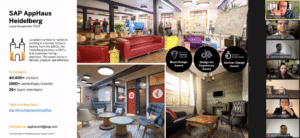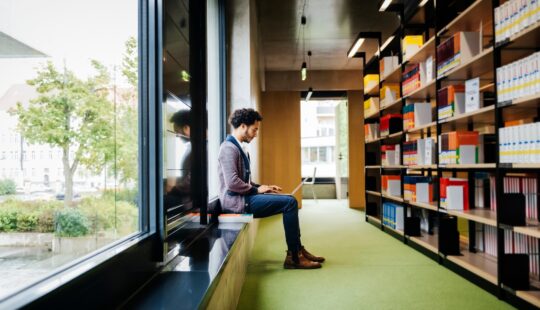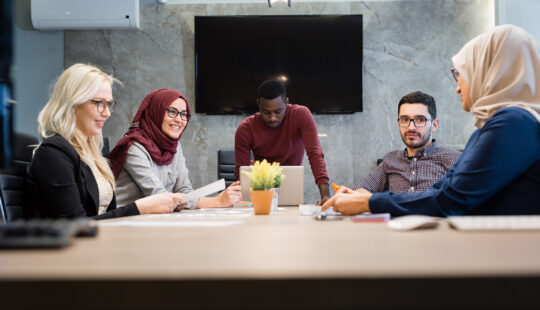The Greek philosopher Plutarch is credited with saying, “The mind is not a vessel to be filled but a fire to be ignited.” At SAP AppHaus, we try to apply this, putting the learner first and holding the teacher accountable to use the right tools to ignite the fire.
With this goal in mind, the global multidisciplinary SAP AppHaus team of designers, project leads, and enterprise architects set about planning and delivering several guest lectures at universities for students, the workforce of the future. It was a pleasure and an honor for the team to be able to share the knowledge and methodologies SAP AppHaus has gathered over the years with students of six different universities in 2021.
It is not only close collaboration and co-innovation with customers that is fundamental to the team. SAP AppHaus also works closely with universities, enabling mutual learning and fostering the promotion of its core innovation values by making them tangible for students. With tight integration into the respective curricula, lectures were held at the University of Mannheim, Ludwig Maximilian University of Munich, DHBW Mannheim, Graduate School Rhein-Neckar in Ludwigshafen, DHBW Mosbach, and Neu-Ulm University of Applied Sciences.

Making Our Key Innovation Values and Practices Tangible
What united the guest lectures was the focus on teaching how SAP AppHaus helps drive co-innovation, particularly during the pandemic, which is marked by virtual work for students as well. Besides an introduction of our SAP AppHaus vision, the “how-to-innovate question” was addressed as the core of the lectures.
The focus was on SAP’s human-centered approach to innovation. Combining design thinking and architecture thinking, it is the key to providing viable, feasible, and desirable innovations for our customers. In addition, the innovation methodologies and best practices included in the Innovation Toolkit, updated and virtualized last year, were also presented. While the guest lecturers condensed the theoretical part, they made the SAP AppHaus innovation approach tangible through well-organized virtual and on-site workshops. After the lectures, students felt empowered to apply what they learned in their own academic, professional, or private contexts.
“For the entire SAP AppHaus team, working with universities is incredibly important. We appreciate the opportunity to pass on the innovative mindset of design thinking combined with SAP technology on the one hand, and to receive valuable feedback from students on the other.”
— Dirk Ziegeler, Head of SAP AppHaus EMEA/MEE
Unleashing Student Creativity with a Hands-On Focus
In addition to teaching some theoretical content, the goal was to bring the methodologies to life by solving a challenge to which all students could relate. Depending on the schedule and needs of the university, the agenda and its content were adapted. All universities considered “design the ideal learning environment in a hybrid world” to be a suitable central challenge. Triggered by the pandemic, universities and students faced the challenge of transitioning from in-person lectures to virtual formats in a very short period of time. To improve the recently established hybrid format, the guest lectures aimed to take on a new approach to teaching and learning by tapping into the enormous creative potential of students.
At the University of Mannheim, known for its first-class teaching in business administration, the guest lecture content was woven into the Digital Marketing Strategy course led by Prof. Dr. Sabine Kuester. After Dirk Ziegeler, head of SAP AppHaus EMEA/MEE, presented SAP AppHaus projects with a focus on customer experience, it was the students’ turn. In a compact workshop using the collaboration tool Mural, students jointly generated solution ideas and developed a visual prototype for an ideal hybrid learning environment.
“At the Chair of Marketing and Innovation, we focus on research and teaching at the interface of marketing and innovation management. The guest lecture was a highly suitable complement to our Digital Marketing Strategy course, as it illustrates the shift towards human-centered marketing and equips students with the right tools to drive innovation themselves. We look forward to continuing this successful collaboration with SAP AppHaus in the coming semesters.”
— Prof. Dr. Sabine Kuester, Chairperson of the Chair of Marketing & Innovation and Director of the Institute of Market-Oriented Management at the University of Mannheim

The latest engagement of SAP AppHaus at the University of Applied Sciences Neu-Ulm originated from an initial guest lecture of Beate Riefer, design strategist at SAP AppHaus, in 2018. Last year, Riefer and Patricia Franzreb, professor for User Experience, Design, and Media, came up with the idea for a competitive user experience project spanning a whole semester. With a focus on sustainability, design, and hybrid co-innovation, students of IT, business administration, and communications worked in teams to ideate and prototype solutions.
“At the University of Applied Science in Neu-Ulm, our first guest lecture a few years ago provided the basis for a long-term collaboration and a corresponding user experience project over the course of one semester. It was incredible to see the students’ innovation potential and ideas come to life, and we are excited to see how they will develop moving forward. I am happy to have been part of this course and look forward to continue working together.”
— Beate Riefer, Design Strategist at SAP AppHaus Heidelberg
Similar to the sessions in Mannheim and Neu-Ulm, the “hands-on experience first” maxim was also applied in the engagements with the Graduate School Rhein-Neckar in Ludwigshafen, as well as DHBW Mannheim, and DHBW Mosbach.
A Win-Win Relationship
Younger generations studying at universities today will shape how we work and collaborate in the next decades. This is why SAP AppHaus is passionate about guest lectures, for they present a great opportunity for students, as well as the team, to learn from each other and leverage synergies. Feedback from the students is particularly valuable as they ask the right questions and challenge the content by taking an external perspective. Students can leverage the applied tools and methodologies to co-innovate virtually, which can help them grow both at their university and in a professional context.
The entire team is thrilled to see how mutually beneficial and fun their guest lectures have been so far, which is why SAP AppHaus maintains an ongoing exchange with universities to enable knowledge-sharing and raise awareness for human-centric and sustainable innovation.
The entire SAP AppHaus team is grateful for the opportunity to collaborate with the universities in Mannheim, Munich, Ludwigshafen, Mosbach, and Neu-Ulm! The guest lecturers value the students’ contributions and are confident that working and learning together has successfully ignited the fire for expanding their knowledge and learning how to make innovation real.
Eric Klebeck is part of Marketing & Communications for SAP AppHaus.
Julia Jakob is part of Communications for SAP AppHaus.



